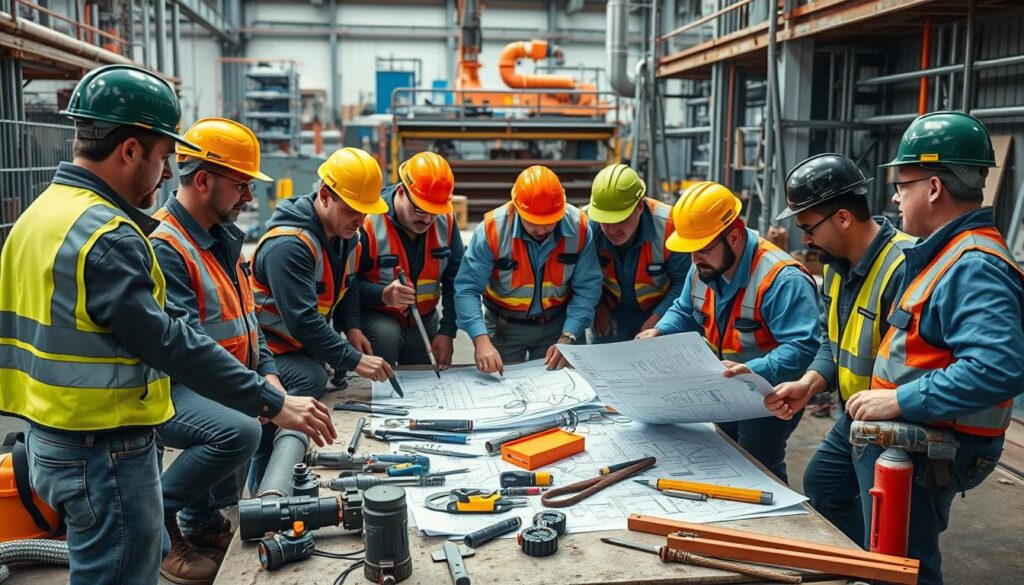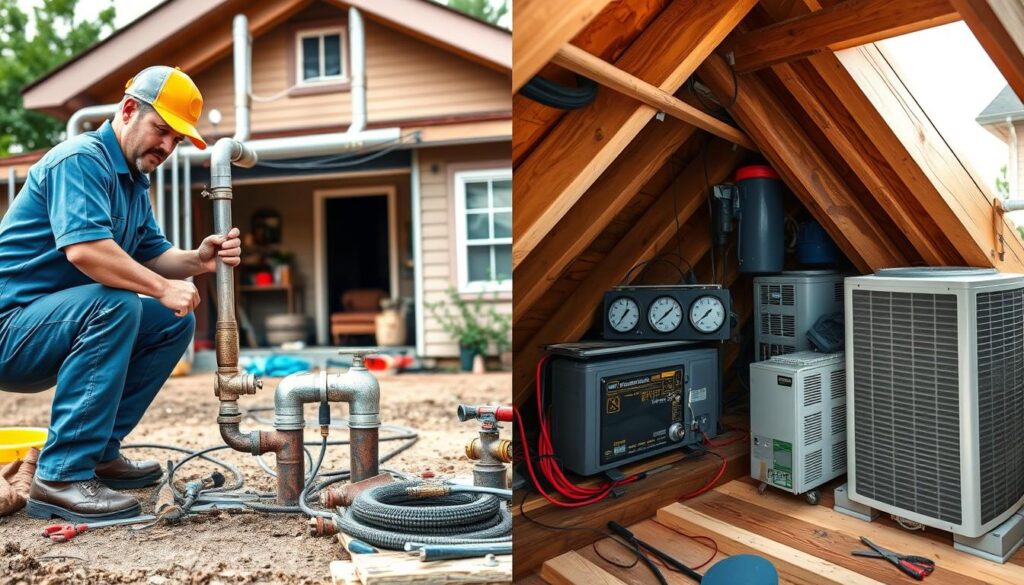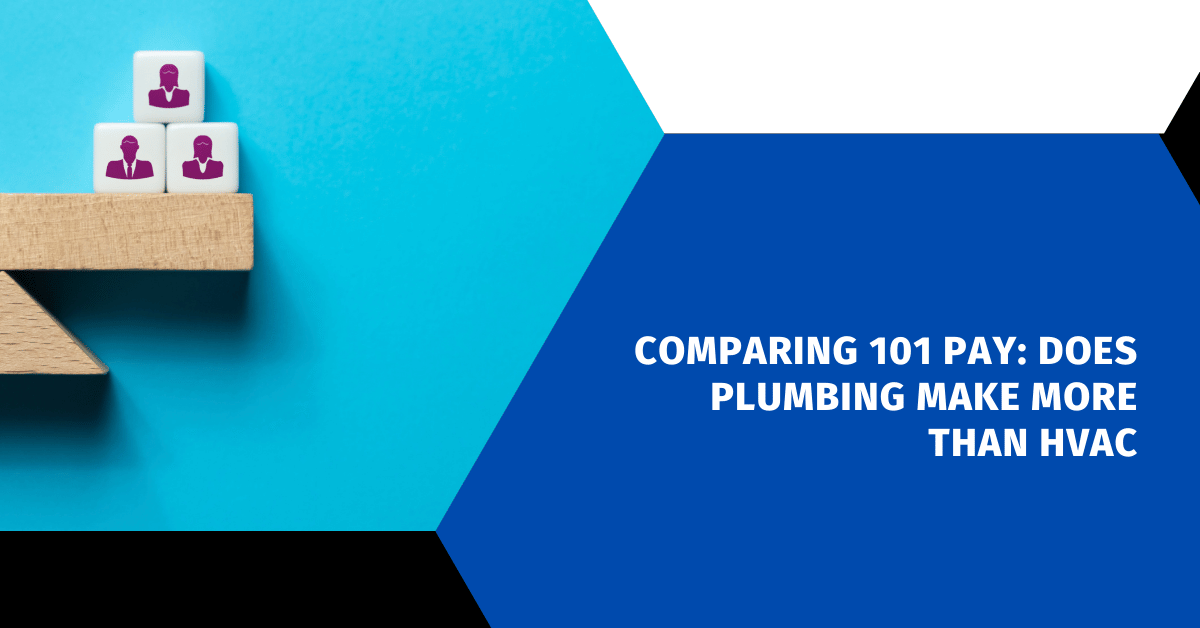Affiliate Disclosure
HVAC Guide Guys is a participant in the Amazon Services LLC Associates Program, an affiliate advertising program designed to provide a means for sites to earn advertising fees by advertising and linking to Amazon.
When you’re thinking about a career in the skilled trades, you might wonder: Does plumbing pay more than HVAC? The debate about who earns more between plumbers and HVAC technicians is ongoing. Let’s explore the salary differences and what affects them.

Key Takeaways
- Plumbers earn a higher median annual salary of $59,880 compared to HVAC technicians at $50,590, according to the Bureau of Labor Statistics.
- Salaries for both trades can vary significantly by geographic location, with high-cost-of-living areas typically offering higher pay.
- Experience level plays a crucial role, with seasoned professionals in both fields earning substantially more than entry-level workers.
- Union jobs in HVAC and plumbing tend to provide higher salaries and better benefits compared to non-union positions.
- Specialized skills, such as expertise in renewable energy systems, can lead to increased earning potential for HVAC technicians.
Table of Contents
Understanding the Salary Gap Between HVAC and Plumbing
Skilled trade jobs like HVAC and plumbing have different pay levels. Both careers are rewarding, but knowing why they pay differently is key. This knowledge helps those thinking about these jobs.
National Average Salary Comparison
Plumbers make about $61,550 on average, while HVAC techs earn around $57,300. This shows plumbing might pay more for skilled workers.
Median Pay Rates by Experience Level
Experience affects how much you earn in both fields. Entry-level HVAC techs start at $37,270, and top earners reach $84,250. Plumbers start at $38,690 and can make over $103,140 as they gain experience.
Regional Salary Variations
Where you work also changes how much you earn. Places like Alaska and Hawaii pay more for both HVAC and plumbing. But, areas like Mississippi and Arkansas pay less. This is due to living costs, demand, and union rules.
| Profession | National Average Salary | Median Salary Range | Job Growth Rate (2023-2033) |
|---|---|---|---|
| Electricians | $61,590 | $38,470 – $104,180 | 11% |
| Plumbers | $61,550 | $38,690 – $103,140 | 6% |
| HVAC Technicians | $57,300 | $37,270 – $84,250 | 9% |
The data shows the pay differences in HVAC and plumbing. It’s important to think about experience, location, and demand when looking at these careers.
Explore Our HVAC Shop
Looking for top-rated HVAC tools, parts, and accessories? Visit our shop and find the perfect solution for your needs.
Visit the ShopExplore Our HVAC Shop
Looking for top-rated HVAC tools, parts, and accessories? Visit our shop and find the perfect solution for your needs.
Visit the ShopCareer Overview: HVAC vs Plumbing Professions
HVAC and plumbing are top choices for skilled trades careers. Both offer great career paths, but they differ in important ways.
HVAC technicians work on systems that control temperature and air quality. They use electrical parts, refrigerants, and machinery to keep buildings and homes comfortable. Plumbers, on the other hand, handle water and sewage systems. They install pipes, fix them, and make sure they meet building codes.
Both jobs need special tools, training, and follow safety rules. HVAC techs work more with electrical and refrigerant systems. Plumbers focus on installing and fixing pipes and water systems.
Even though they’re different, HVAC and plumbing share some things. Both offer steady jobs and chances to specialize. They’re also growing fields, with more demand in the trade job market and skilled trade career paths.
| Profession | Average Salary | Job Outlook (2020-2030) |
|---|---|---|
| HVAC Technician | $52,000 per year | 5% growth |
| Plumber | $59,880 per year | 5% growth |
Whether you’re looking at hvac vs plumbing career prospects, both are solid choices in skilled trades. Your choice will depend on your interests, skills, and goals.
Does Plumbing Make More Than HVAC: A Detailed Analysis
The debate about plumbing and HVAC salaries is common in the skilled trades. Entry-level jobs in both fields pay well. But, the gap grows as workers gain experience and specialize.
Entry-Level Income Differences
New plumbers and HVAC technicians start with similar salaries. Plumbers earn about $50,000 a year, while HVAC techs make around $47,000. This difference might be due to extra training and licenses for plumbers.
Mid-Career Earning Potential
As plumbers and HVAC techs advance, the salary gap widens. Mid-career plumbers, with special skills or certifications, earn more. They can make over $60,000, while HVAC techs earn about $55,000.
Senior-Level Compensation
At the top, plumbers often earn more. Experienced plumbers can make over $100,000 in some areas. HVAC techs at the same level make between $65,000 and $85,000. Overtime, emergency calls, and special skills boost plumber earnings.
The plumbing vs. hvac salary comparison shows plumbers can earn more, especially with experience. But, location, demand, and specialization also play big roles in both trades.
Explore Our HVAC Shop
Looking for top-rated HVAC tools, parts, and accessories? Visit our shop and find the perfect solution for your needs.
Visit the ShopGeographic Location Impact on Trade Salaries
Location greatly affects the salaries of plumbers and HVAC technicians. Salaries vary a lot by state or region. Places with high living costs and booming construction pay more for these skills.
In Alaska, plumbers can make over $85,000 a year. In Puerto Rico, they earn less than $24,000. HVAC techs in Hawaii or Washington D.C. make about $70,000. But in Mississippi, they earn around $42,000. These differences are due to state-by-state trade pay and location-based income for trades.
Urban areas pay more than rural ones because of higher demand and living costs. Workers in big cities like New York, Los Angeles, or Chicago earn more. This is compared to smaller towns or rural areas.
| Location | Plumber Median Salary | HVAC Technician Median Salary |
|---|---|---|
| Alaska | $85,000+ | $60,000 |
| Puerto Rico | $24,000 | $35,000 |
| Hawaii | $70,000 | $70,000 |
| Washington D.C. | $72,000 | $68,000 |
| Mississippi | $48,000 | $42,000 |
“The location-based income for trades can be a significant factor in determining salaries for plumbers and HVAC technicians. Understanding these regional salary differences is crucial for professionals in these industries.”
Explore Our HVAC Shop
Looking for top-rated HVAC tools, parts, and accessories? Visit our shop and find the perfect solution for your needs.
Visit the ShopEducation and Certification Requirements
Getting into trades like plumbing or HVAC needs special education and certifications. Both areas focus on hands-on training and classroom learning. This ensures students are ready for the technical challenges of their job.
Required Licenses and Certifications
HVAC techs often need an EPA certification for refrigerants. They might also need a gas technician certification, depending on the job. Plumbers usually just need a trade license, unless they work with gas lines.
Training Duration and Costs
Apprenticeships for plumbers and HVAC techs last 4 to 5 years. They mix on-the-job training with classroom learning. Apprentices earn money while learning, making these careers affordable for many.
Continuing Education Impact on Earnings
Staying current with education and certifications can boost earnings. As technology and standards change, keeping up helps find better jobs and higher pay.
| Metric | Plumbers | HVAC Technicians |
|---|---|---|
| Average Salary (2023) | $67,840 | $59,620 |
| Projected Job Growth (by 2032) | 2% | 6% |
| Apprenticeship Duration | 4-5 years | 3-5 years |
| Certifications Required | Trade License | EPA, Gas Technician |
Understanding the education, certification, and costs for trades like plumbing and HVAC is key. It helps shape a career path and future earnings. Knowing these details helps make smart choices for a trade career.
Explore Our HVAC Shop
Looking for top-rated HVAC tools, parts, and accessories? Visit our shop and find the perfect solution for your needs.
Visit the ShopUnion vs Non-Union Pay Differences
The pay for plumbing and HVAC jobs differs between union and non-union workers. Union jobs usually pay more and offer better benefits than non-union ones.
Union workers get higher wages because of collective bargaining. For example, HVAC union technicians start at $15 an hour. After 4-5 years, they can earn over $42 an hour. Non-union workers might earn a bit more at first, but union wages catch up and often surpass them.
Being in a union offers more than just higher pay. Union workers get a regular 8-hour day, paid holidays, and vacation time. They also get overtime pay and comprehensive medical and dental benefits without extra costs.
Union dues are around 30 to 45 cents an hour, plus 0.75% of their pay. But the benefits and job security union members get are worth it. They tend to stay with their employers longer, and the union supports them with employer issues.
| Metric | Union Plumbing/HVAC | Non-Union Plumbing/HVAC |
|---|---|---|
| Starting Wage | $15/hour (helper) | Slightly higher |
| Top Wage | Over $42/hour | Lower than union |
| Benefits | Comprehensive medical/dental, paid holidays/vacation, overtime pay | Limited or no benefits |
| Union Dues | 30-45 cents/hour, plus 0.75% of gross pay | N/A |
| Job Security | High, with union support | Lower, no union representation |
Choosing between union and non-union work depends on weighing benefits against costs. While union membership has financial costs, the higher pay, better benefits, and job security make it attractive to many.

Explore Our HVAC Shop
Looking for top-rated HVAC tools, parts, and accessories? Visit our shop and find the perfect solution for your needs.
Visit the ShopBenefits and Additional Compensation
Exploring skilled trades like plumbing and HVAC reveals great benefits. These perks add value to your job, beyond just your salary.
Healthcare and Insurance Packages
Many jobs in trade job benefits come with excellent health insurance. You and your family get covered well. Dental and vision insurance are also common, offering full healthcare support.
Retirement Plans and Bonuses
Plumber and hvac technician perks include great retirement plans. You might get 401(k) plans, pension contributions, or profit-sharing. Some companies also offer bonuses based on your performance, increasing your earnings.
Overtime Opportunities
Overtime pay in trades is a big plus. You can work extra hours during busy times or emergencies. This can earn you time-and-a-half or double-time pay, boosting your income.
These benefits make a career in plumbing or HVAC very rewarding. They add a lot of value to your job, beyond just your salary.
Explore Our HVAC Shop
Looking for top-rated HVAC tools, parts, and accessories? Visit our shop and find the perfect solution for your needs.
Visit the ShopWorking Conditions and Physical Requirements
Working in HVAC and plumbing can be tough. HVAC technicians deal with all sorts of temperatures and tight spots. Plumbers often work in small areas and might face dirty conditions.
These jobs need a lot of physical strength and stamina. You have to be okay with heights or small spaces. Safety training is key because of dangers like asbestos and mold.
- Ability to work in extreme temperatures, both hot and cold
- Comfort with climbing ladders and working at heights
- Strength to lift and maneuver heavy tools and equipment
- Familiarity with safety protocols for handling hazardous substances
Despite the challenges, many find these jobs rewarding. The sense of solving problems and earning well makes it all worth it.

“The physical demands of this job are no joke, but the sense of accomplishment when you solve a complex issue is incredibly rewarding.” – Tiffany, HVAC Technician
Career Growth and Advancement Opportunities
The plumbing and HVAC industries have many paths for career growth. You can specialize in areas like commercial systems or green technologies. Roles like project manager or business owner are possible.
HVAC technicians can move into energy auditing or building automation. Plumbers might become plumbing inspectors or install medical gas systems. Starting your own business is also an option.
HVAC technicians can earn up to $70,000 a year. Plumbers make around $54,620 on average. Both fields are growing fast, with a 21% job growth rate.
Those with an associate’s degree earn about $43,472 a year. High school graduates make around $37,024. This shows the importance of education and certifications in these fields.
Whether you want to specialize, lead a team, or start a business, there are many opportunities. With the right skills and dedication, you can grow your career in these exciting industries.
Explore Our HVAC Shop
Looking for top-rated HVAC tools, parts, and accessories? Visit our shop and find the perfect solution for your needs.
Visit the ShopIndustry Demand and Job Security
The job outlook for plumbing and HVAC is bright, with steady demand and job security. The U.S. Bureau of Labor Statistics (BLS) says the plumbing industry will grow by 4 percent. This will add 20,900 plumbing jobs over eight years.
The median pay for plumbers in 2020 was $56,330. Entry-level plumbers made $46,400, while senior plumbers with 4-6 years of experience earned $60,700.
The HVAC industry is also growing, thanks to renewable energy. The BLS predicts 48,600 new openings for plumbers, pipefitters, and steamfitters each year from 2021 to 2031. This shows a strong job outlook for trades.
Several factors drive the demand for plumbing and HVAC services. These include aging infrastructure, energy efficiency, and the need for maintenance and repairs. These services are essential, ensuring consistent work even in tough economic times.
Technological advancements are creating new specializations and jobs in both fields. This is expanding the future of plumbing and HVAC professions. Companies are offering competitive salaries, better benefits, and training to attract skilled workers.
“Plumbing work offers job security and the ability to advance and grow within the industry. Plumbing companies are facing a labor shortage, requiring them to offer higher wages, better benefits, and on-the-job training to attract new talent.”
Explore Our HVAC Shop
Looking for top-rated HVAC tools, parts, and accessories? Visit our shop and find the perfect solution for your needs.
Visit the ShopConclusion
Choosing between plumbing and HVAC is more than just looking at salaries. Plumbers might earn a bit more than HVAC techs. But both trades offer good pay and strong job prospects.
Think about what you enjoy doing, the work environment, and your future plans. Both plumbing and HVAC let you specialize and move up in your career. Plumbers can earn up to $75,000 a year, while HVAC techs average around $52,000. But HVAC techs can make more with overtime and bonuses.
Deciding between plumbing and HVAC depends on your personal interests and career goals. Look at licensing, training, and job growth. This will help you choose a path that fits your long-term goals and career growth.
Explore Our HVAC Shop
Looking for top-rated HVAC tools, parts, and accessories? Visit our shop and find the perfect solution for your needs.
Visit the Shop
